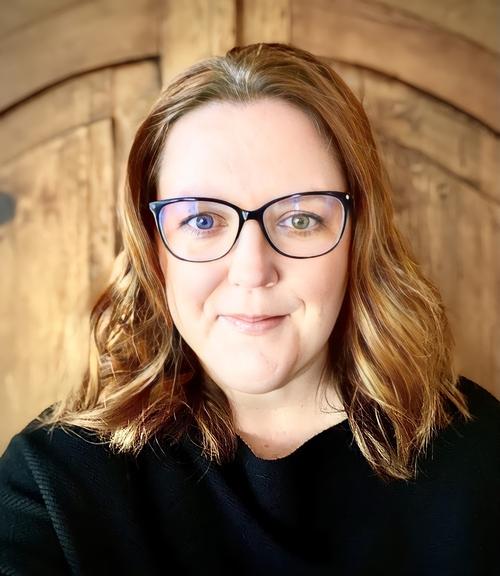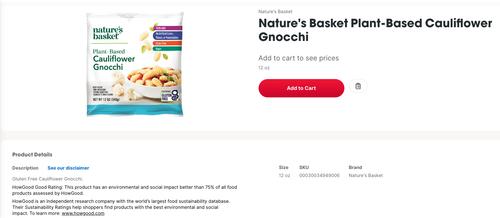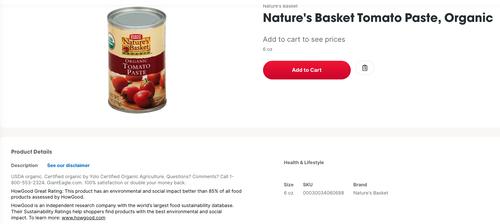Q&A: An Inside Look At Giant Eagle's Nature's Basket Redevelopment
Recently, Giant Eagle took a major step forward with its sustainability efforts as it relaunched its Nature’s Basket private label brand.
With a focus on offering products that are responsibly sourced and offer high-quality ingredients, the grocer teamed with independent sustainability intelligence company — HowGood — to evaluate the environmental and social impact of each item in the Nature’s Basket line and provide a comprehensive sustainability rating.
Products that achieve HowGood ratings of good, great, and best have an overall environmental and social sustainability impact that is better than more than 70%, 85%, and 95% of food products assessed by HowGood, respectively. Approximately 70% of Nature’s Basket items have received a HowGood rating in one of these three categories.
During the process, the team at Giant Eagle have fine-tuned their knowledge of sustainability issues, which is expected to be an asset with future product development efforts, said Cara Mercil, the grocer’s director of Sustainability and Corporate Social Responsibility.
Mercil spoke with Store Brands to offer insight on Giant Eagle’s initiative, the positive impact HowGood has had on products in the Nature’s Basket line, and the impact this effort could have on the products shoppers buy going forward.
STORE BRANDS: What were some of the factors behind the relaunch of Nature’s Basket with its enhanced sustainability components?
CARA MERCIL: We’re on a journey to make it easier for health conscious customers to find food and information resources that fit their lifestyle and are in one place. We believe that we're leaders in the retail market for sustainability, and we're responding to the growing demand for transparency around products and their environmental, and social impact. The Nature's Basket brand was originally launched more than a decade ago and this is the next big evolution for the brand. As we understand more about this kind of interconnectedness to our food systems, it was really important that we took a fresh perspective and made sure that all of those issues that we think about as consumers were addressed within the brand itself. We see Nature's Basket as our most sustainable brand, and that is something that we talk about internally and something that we really want to see reflected in this brand. We took a fresh look at our responsible sourcing guardrails and thought about it more critically at the category level.
STORE BRANDS: When you talk about products in the assortment, does this initiative cover all items under the Nature’s Basket brand?
MERCIL: The guardrails we established are for the entire Nature's Basket brand. While the brand is not in every product category, it is in a lot of categories. Additionally, we are also expanding the brand significantly with this relaunch as we know consumers are really looking for this kind of product.
STORE BRANDS: How long has this endeavor been in the works at Giant Eagle?
MERCIL: We started this relaunch more than a year ago. From the start, we were committed to the idea of transparency but we didn’t want that transparency to be solely from us. We wanted our customers to be able to get an independent review of our products. In addition to the work that we did with HowGood, we also took a broad holistic look at what the guardrails would be and wanted to approach every part of this differently. We took a look at meat, we took a look at dairy, and at produce, and crafted and created guardrails specifically and differently for each one of those categories. And then the last side of it was around packaging. We are working with a fresh perspective around reviewing the packaging at the component level. We’re looking to change over wherever it's possible to create more recyclable, reusable, or biodegradable packaging. In addition, we have partnered with How to Recycle as well so we can make the instructions very easy for our customers to see and understand and be able to instruct them on what to do with these packages.
STORE BRANDS: How has this endeavor impacted Giant Eagle’s relationships with its suppliers?
MERCIL: We are partners with our suppliers, especially on the own brand side. As a result, we have had ongoing conversations with them about how we can adjust formulations and how we can think about packaging differently. We also understand that we’re on a journey and that we don’t have the perfect solution for every product. This is about moving us all towards a more sustainable product line and a more sustainable future for all of us. That is what our customers really want from us. And at the end of the day, we want to deliver a product line that meets our customer's values and shows that we're listening to what they want.
STORE BRANDS: How does the relationship with HowGood work as they certify products in the Nature’s Basket line?
MERCIL: Initially how the process worked is different from how we use it on an ongoing basis. For some background, HowGood has been researching the food supply system for about 17 years. They're amassing a huge database that maps about 33,000 ingredients, which includes chemicals, materials, processes, and geographies. It all comes into this very large database that looks at products at the ingredient level. They then screen against a number of categories. They look at greenhouse gas emissions, biodiversity processing, water usage, labor risk, land use, soil health, and animal welfare. They take all of these issues and then create an easy to understand overall rating system of good, great and best so that our consumers can have a very clear understanding of what they're getting with products they're purchasing.
STORE BRANDS: Has working with HowGood changed the product development process for Nature’s Basket products?
MERCIL: It is very challenging to find reliable information about our food. We wanted to support our customers by allowing an independent third party to assess our products at the ingredient level and provide a clear rating. At the start, we did that with all of our initial products to see where we sat. We felt really good about the ratings that we received across the line. Going forward, as we develop products on an ongoing basis we are submitting them in groups to see how those products are rated. What we're seeing is improvement overall because we've set these guardrails and thoughtfully put in requirements into each one of the category levels. The result is that we're seeing a much higher rating overall for the individual products as we are submitting to HowGood.
STORE BRANDS: As a result of having this knowledge, it would seem Giant Eagle has a head start when sourcing and developing products going forward.
MERCIL: Yes, and it has also provided us with different insights. For example, when looking at tomatoes, not all tomatoes are the same. They can have wildly different impacts on the environment and social aspects. If you were to take a tomato and say this one is organic versus this one that is not organic, that's easy to understand and something that we would have thought about beforehand because of the pesticide application, soil enrichments, and other issues. Now, we’re going to think about those issues right out of the gate and understand how that tomato is going to have an improved impact on the environment. But then you start to consider these cross hatching ideas of where that tomato is grown in the world. If that tomato is grown in a water scarce environment, that's going to have a different impact on the environment. Or if that tomato is grown in an area in the world that is further away from our facilities, it's going to have more road miles. That’s a different issue we would have needed to consider. Another issue is where this tomato would have been grown that may have less favorable labor conditions. HowGood has allowed us to look at this in a multidimensional way and provided this single score that gives us clarity both within our own sourcing systems and for our customers.
-
"We wanted our customers to be able to get an independent review of our products. In addition to the work that we did with HowGood, we also took a broad holistic look at what the guardrails would be and wanted to approach every part of this differently." -- Cara Mercil, Giant Eagle
STORE BRANDS: With all the work being done behind the scenes, how is Giant Eagle messaging this initiative to its customers?
MERCIL: We are going out into our marketplace and through our e-commerce platform to provide information to shoppers about the ratings. We are also providing in-store signage to make our customers aware of what HowGood is and drive them to our website where they can get more information about the products.
STORE BRANDS: With Giant Eagle focusing this effort on its private label, do you think there will be a cascading effect that could impact even national brand products?
MERCIL: We hope that that's the case. One thing I think is very special about sustainable products and sustainability in general really is that there's less competition because we're all working to improve our planet and to improve our own health. That effort takes all of us working together. It's not simply that Giant Eagle can make huge changes. It's all of us working together. And it's groups like our private label that are able to make improvements that support our communities, support our economy, and support our planet moving forward.





